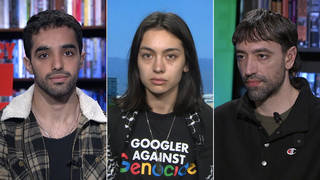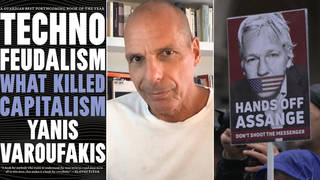
Related
Guests
- Brandon JourdanIndependent journalist subjected to repeated searches and interrogations by U.S. customs at airports during his international travels. Jourdan most recently worked for Democracy Now! as a videographer covering the G-20 protests in Canada.
- Catherine CrumpStaff attorney with the American Civil Liberties Union who focuses on free speech and privacy rights.
Independent journalist Brandon Jourdan recently returned from Haiti after being on assignment documenting the rebuilding of schools in the earthquake-devastated country. However, when he returned to the United States, he was immediately detained after deboarding the plane by U.S. Immigration and Customs Enforcement agents. He was questioned about his travels and had all of his documents, computer, phone and camera flash drives searched and copied. This is the seventh time Jourdan says he has been subjected to lengthy searches in five years, and has been told by officials that he is “on a list.” Jourdan joins us in our studio. Catherine Crump, a staff attorney for the American Civil Liberties Union, says that Jourdan is not the only one facing such treatment by the Obama administration. Crump says many journalists and lawyers who often work abroad have also experienced similar interrogations—and the ACLU believes the First and Fourth Amendments must be honored within U.S. airports. [includes rush transcript]
Transcript
AMY GOODMAN: U.S. citizens returning home from foreign travel can be searched by Immigration and Customs Enforcement agents just like anyone else. But our next guest is an independent journalist who estimates he’s been subjected to lengthy searches at least seven times in the last five years.
Brandon Jourdan most recently worked as a videographer for Democracy Now! covering the G-20 protests in Canada. This past weekend, Brandon was returning to New York from Haiti when ICE subjected him to a five-hour search and copied the contents of his laptop, along with his external hard drive and phone.
Brandon Jourdan joins me here in New York. We’re also joined by Catherine Crump, staff attorney with the American Civil Liberties Union, specializing in free speech and privacy issues.
We welcome you both to Democracy Now! Brandon, talk about what happened to you when you flew into JFK Airport from Port-au-Prince.
BRANDON JOURDAN: When I flew into New York from Haiti, after I’d worked for two weeks covering rebuilding projects on schools in Haiti, I had first heard on the intercom that they wanted everyone to have their passports out. I pulled my passport out. When I walked out onto the skyway, two Immigration and Customers Enforcement officers took me by the arm and led me to a Homeland Security room.
AMY GOODMAN: Wait, so are saying that they told everyone to have their passports out because actually they were looking for you?
BRANDON JOURDAN: They were looking for me.
AMY GOODMAN: Well, how do you know, once you left, that they didn’t go through everyone else’s passports on the plane?
BRANDON JOURDAN: They left with me. They didn’t continue — they didn’t continue looking at passports.
AMY GOODMAN: And what did they do? Where did they take you?
BRANDON JOURDAN: They took me to, I guess, a Homeland Security office within the JFK airport. At that point, they began looking through all of my clothes, everything. I strategically put a copy of the First and Fourth Amendment in my bags, because this has happened before, and also on my computer and my smartphone and on my hard drives. They took my journal, all my business cards, all that. They said they were going to photocopy them all. They took —
AMY GOODMAN: Did they explain why they were doing this?
BRANDON JOURDAN: I asked them, “Why are you doing this?” They basically said, “You’re on a list. We don’t know why. These are orders” —
AMY GOODMAN: You’re on a list?
BRANDON JOURDAN: Yeah. And “These are orders from Washington.” And they copied my hard drive. They copied my laptop. They copied every single one of my compact flash cards that I use for my camera, which is absurd to me, because I was documenting people building schools and a country devastated by an earthquake.
AMY GOODMAN: And then they gave everything back, after many hours?
BRANDON JOURDAN: I think, if I’m correct, around 6:30, I left the airport. I mean, around 6:30, I left the plane, and it was 10:30, 11:00 before I left, which is about medium for what I have to go through.
AMY GOODMAN: Catherine Crump, you’re with the ACLU. What rights does a passenger have coming into the airport?
CATHERINE CRUMP: The ACLU believes that people have a First and Fourth Amendment right not to have the materials they bring with them, specifically their expressive materials — their laptops, their cell phones, their papers — searched unless the government has a reasonable suspicion that they have engaged in wrongdoing. Unfortunately, the Obama administration, like the Bush administration, has taken the view that it can search people’s electronic devices at the border for any reason or no reason at all. So they think they don’t have to have any suspicion that the laptop contains evidence of a crime before they search it.
AMY GOODMAN: The Obama administration?
CATHERINE CRUMP: The Obama administration believes that. And we filed a lawsuit challenging that policy, because we think that the Constitution says otherwise.
AMY GOODMAN: Brandon Jourdan, this isn’t the first time.
BRANDON JOURDAN: No.
AMY GOODMAN: What happened before this?
BRANDON JOURDAN: OK, well, for instance, on November 7, 2010, I had just got back from seeing my girlfriend, now my fiancée, who is a professor at the University of Leiden. Before I got on the plane —
AMY GOODMAN: And this was in the plane where?
BRANDON JOURDAN: This was in Amsterdam at Amsterdam Schiphol Airport. Before I even got on the plane, ICE approached me and questioned me.
AMY GOODMAN: American authorities.
BRANDON JOURDAN: American authorities in Amsterdam Schiphol Airport, ICE, questioned me. They asked what I had been doing. I said, “I went and saw my girlfriend, Marianne Maeckelbergh. She’s a professor,” which I thought was really weird. I mean, why do they care? And then they asked me, “You sure you didn’t go anywhere else in Europe?” And if I had of went somewhere else in Europe, there’s nothing criminal about that.
Then I got back. I got back to the United States. I was pulled off the plane. This time they announced my name over the intercom. They said, “Everyone have their passports out. William Jourdan,” — William is my first name — “report to the cabin crew.” I reported to them. Once again, everything was photocopied. My computer, everything was copied. I was held for, I think, approximately about six hours. I was tired. I was jet-lagged. I just wanted to go home. I hadn’t done anything wrong. My work as a journalist is protected, or should be protected.
AMY GOODMAN: And what did they say to you then, why they were doing this?
BRANDON JOURDAN: I, honestly — they didn’t really respond at all. They were more forthcoming with information this time than they had in the past. All they’ve usually said in the past is like, “You’re on a list,” or “We don’t know.”
AMY GOODMAN: When did this all start?
BRANDON JOURDAN: Well, I worked in 2008 in the Gaza Strip. I was working — I was commissioned by a nonprofit called the Council for National Interest, which is a bunch of former State Department people, whatnot, who basically collect information on what’s happening in the Middle East. Now, during that time, we interviewed a lot of people, for instance, the Egyptian Foreign Ministry — the former Egyptian Foreign Minister, the U.S. embassies. And we went into the Gaza Strip, and we interviewed people from the U.N., and we also interviewed Ismail Haniyeh, the leader of Hamas, a controversial figure, but the work I was doing was documenting something and something that I feel serves a public good.
AMY GOODMAN: So, after Gaza, what happened?
BRANDON JOURDAN: After Gaza — the first time, I don’t think they pulled me from the plane. The first time, I just went through. When I was going through the regular customs thing, they pulled me aside, and then they questioned me. They photocopied all my journal. They photocopied all my business cards. They were really interested in anything that was in Arabic. And that’s when it began.
And then, the same summer, within — I flew back to New York. I finished up some work in Washington, as well, and then I flew to Japan, where I was invited to speak at the G-8 protests that were happening, not at the protest, but at some universities while it was going on. I did a lot of work on the movement against corporate globalization. And when I came back, that was when they really started pulling me from the plane. And that was when I realized that the way I travel was forever altered, that I’m on a list, and this is the way — this is a routine now. This is protocol for how they handle me.
AMY GOODMAN: When you came back from Haiti, you had a camera?
BRANDON JOURDAN: Oh, yeah.
AMY GOODMAN: They took the camera?
BRANDON JOURDAN: They took my camera. They took anything —- anything that had media that they could copy, they copied it. And when I worked for the -—
AMY GOODMAN: They know how to work the camera?
BRANDON JOURDAN: They took the flash card. They didn’t really need the camera. Now, when I came back from — when I worked for Democracy Now! at the G-20 protests, they asked me how to use my camera. They took my tapes.
AMY GOODMAN: And then they said?
BRANDON JOURDAN: They said, you know, “How do we turn this on?”
AMY GOODMAN: Catherine Crump?
CATHERINE CRUMP: This is a distressingly common scenario. One of the plaintiffs in our ongoing lawsuit is the National Press Photographers Association. Their members have been searched previously, just like you’ve been searched. And of course, journalists have a special interest in not having their expressive materials searched. Many people speak to confidential sources and often become very concerned that their sources overseas aren’t going to be able to trust them anymore, if they know that talking to a journalist means that when you cross the border, the U.S. government may access the journalist’s notes or pictures and so forth. So it’s a real problem.
AMY GOODMAN: I mean, a journalist then becomes an agent of the state, because they are just gathering information that is then collected by the state when they return.
CATHERINE CRUMP: That’s right. And the problem even goes beyond journalists. It certainly affects journalists, but lawyers who are defending people have the same problem. Many people who have defended Guantánamo detainees have had to go overseas to gather evidence. And the idea that they would be gathering evidence to defend someone who’s being prosecuted by the U.S. government and then, by crossing the border, turned all of that over to the U.S. government is something that really threatens a lawyer’s ability to do their job, just like it threatens journalists’ ability to do their jobs. But, you know, even people who aren’t part of the professions often have very sensitive information on their computers. When you think about it, people have their financial records, their family photographs, their personal diaries. And the idea that we, as Americans, should have to show all of that stuff to the government just because we travel internationally is really contrary to our basic values.
AMY GOODMAN: Brandon, did you have journals?
BRANDON JOURDAN: I mean, after this situation started, I quit writing down certain details. If I have to, I find another way to get it home. I’m also very cognitive of the fact that I can jeopardize the subjects that I’m trying to record. And so, I take — and Amy, I have to go through this all the time. I mean, I just had to do a deposition for some footage that I shot at the inauguration in 2005. And I willingly did that, because it was actually for activists, and I didn’t mind going forward because it helped their case.
AMY GOODMAN: How does this make you feel when you go through this?
BRANDON JOURDAN: It makes me paranoid. It makes me angry. And —
AMY GOODMAN: Will you sue?
BRANDON JOURDAN: Of course. As soon as I find a lawyer to do it, I will sue everyone until I can be removed from this list, until I can get justice. And I’m not an individualist. I’m doing this because — out of principle, because if I’m getting searched, I guarantee you there are a whole bunch of people that have a similar experience.
AMY GOODMAN: Catherine Crump, who are you representing in your suit?
CATHERINE CRUMP: We represent two organizations and an individual. We represent the National Association of Criminal Defense Lawyers, the National Press Photographers Association and a man named Pascal Abidor. He is a U.S. citizen who’s studying in Canada. And when he was coming across the border on the train, a border agent stopped him, asked what he studied — he said he studied Islamic studies — and asked where he’d been — and he had been to Jordan and Lebanon — and on that basis, hauled him to the cafe car, opened up his laptop, and proceeded to require him to turn over his passport and — password to his laptop, and then searched the contents. I don’t believe that the mere fact that someone chooses to study Islamic studies means that the government has a good reason to go through their laptop.
AMY GOODMAN: Catherine, do passengers have any rights to privacy under the Obama administration?
CATHERINE CRUMP: Unfortunately, the Obama administration has taken a very anti-privacy view here. The policy is extremely broad. It’s not just that the government can search the contents of your laptop.
AMY GOODMAN: We have just ten seconds.
CATHERINE CRUMP: They can copy it. They can even detain it for, they say, as long as they need to make sure that you’re not carrying anything criminal. And we think they need reasonable suspicion in order to do so.
AMY GOODMAN: I want to thank you both very much for being with us.
BRANDON JOURDAN: Thank you, Amy.
AMY GOODMAN: Catherine Crump, staff attorney with the ACLU, and Brandon Jourdan, an independent journalist who has been searched repeatedly by federal authorities when he comes into airports here in the United States and even outside.












Media Options